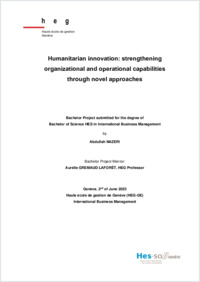Humanitarian innovation : strengthening organizational and operational capabilities through novel approaches
SONAR|HES-SO
- Nazeri, Abdullah
- Gremaud-Laforêt, Aurélie (Degree supervisor)
- Genève : Haute école de gestion de Genève
123 p.
Bachelor of Sciences HES in International Business Management: Haute école de gestion de Genève, 2023
English
The growing number of crises throughout the world, combined with the limited availability of resources, has pushed the humanitarian sector to change its approach to crisis response. This has led humanitarian organizations to shift towards more innovative and sustainable ways and solutions. For the past decade, the concept of humanitarian innovation has gained in popularity. However, its exact meaning is still poorly understood by many.
The purpose of this exploratory research is to investigate how humanitarian organizations can foster internal innovation and improve crisis response through innovative approaches and partnerships with the private sector. The study is centered around key objectives. First, it aims to learn the benefits of encouraging innovation within humanitarian organizations and to identify the obstacles that organizations encounter when trying to accelerate humanitarian innovation. Furthermore, it tries to find various tools and approaches which help to stimulate innovation at organizational level. Finally, it attempts to assess the impact of collaboration with the private sector.
The findings show that fostering innovation within humanitarian organizations can greatly improve their operations’ effectiveness and efficiency. Nonetheless, a variety of barriers emerge when innovating. They include restrictive funds, rigid internal procedures and reluctance to change. However, nurturing a culture of innovation and breaking down some barriers can be enabled by clearly defining the concept of innovation and educating organizations’ leaders and members. Additionally, encouraging open communication and incorporating innovation into operations could be valuable for humanitarian organizations. Practical tools and approaches for promoting innovation were identified, such as establishing dedicated innovation units and stimulation mechanisms related to innovation.
Several key recommendations are raised to encourage innovation and enhance both internal and external operations. These involve leveraging technologies while keeping in mind their ethical implications. Moreover, making use of networks and innovative funding, as well as adapting procedures would be meaningful to achieve this purpose.
Finally, the success of partnerships with private companies can be ensured by aligning strategic goals, communicating clearly, finding mutually beneficial outcomes, and effectively negotiating intellectual property rights.
The purpose of this exploratory research is to investigate how humanitarian organizations can foster internal innovation and improve crisis response through innovative approaches and partnerships with the private sector. The study is centered around key objectives. First, it aims to learn the benefits of encouraging innovation within humanitarian organizations and to identify the obstacles that organizations encounter when trying to accelerate humanitarian innovation. Furthermore, it tries to find various tools and approaches which help to stimulate innovation at organizational level. Finally, it attempts to assess the impact of collaboration with the private sector.
The findings show that fostering innovation within humanitarian organizations can greatly improve their operations’ effectiveness and efficiency. Nonetheless, a variety of barriers emerge when innovating. They include restrictive funds, rigid internal procedures and reluctance to change. However, nurturing a culture of innovation and breaking down some barriers can be enabled by clearly defining the concept of innovation and educating organizations’ leaders and members. Additionally, encouraging open communication and incorporating innovation into operations could be valuable for humanitarian organizations. Practical tools and approaches for promoting innovation were identified, such as establishing dedicated innovation units and stimulation mechanisms related to innovation.
Several key recommendations are raised to encourage innovation and enhance both internal and external operations. These involve leveraging technologies while keeping in mind their ethical implications. Moreover, making use of networks and innovative funding, as well as adapting procedures would be meaningful to achieve this purpose.
Finally, the success of partnerships with private companies can be ensured by aligning strategic goals, communicating clearly, finding mutually beneficial outcomes, and effectively negotiating intellectual property rights.
- Language
-
- English
- Classification
- Economics
- Notes
-
- Haute école de gestion Genève
- International Business Management
- hesso:hegge
- Persistent URL
- https://folia.unifr.ch/global/documents/327457
Statistics
Document views: 191
File downloads:
- IBMBT_23_NAZERI_Abdullah_VF.pdf: 273
